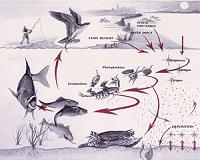| . |  |
. |
East Lansing, MI (SPX) Apr 15, 2011 Michigan State University Just as monarch butterflies depend on circadian cues to begin their annual migration, so do plants to survive freezing temperatures. All living things - humans, animals, plants, microbes - are influenced by circadian rhythms, which are physical, mental and behavioral changes that follow a 24-hour cycle. In the current issue of the Proceedings of the National Academy of Sciences, Michael Thomashow, University Distinguished Professor of molecular genetics, along with MSU colleagues Malia Dong and Eva Farre, has identified that the circadian clock provides key input required for plants to attain maximum freezing tolerance. "The integration of cold-signaling pathways with the circadian clock may have been an important evolutionary event that has contributed to plant adaptation to cold environments," Thomashow said. Thomashow, who is an elected member of the National Academy of Sciences for his contributions to the field of plant biology, has focused his research on the identification of stress response pathways involved in freezing and drought tolerance. Stresses, including extreme temperatures and water deficit, are major factors that limit the geographical locations where food and potential bioenergy crops can be grown. His research led to the identification of the C-repeat binding factor, or CBF response pathway, a stress pathway that can be found in many different plants and plays a major role in freezing and drought tolerance. Reducing abiotic stresses, such as extremes in temperature and drought, can help expand where crops can be grown and increase yields on an annual basis, Thomashow said. "Increasing the abiotic stress tolerance of crops is integral to keeping food production apace with the increasing world population and to the national vision of replacing a significant proportion of petroleum-based transportation fuels with renewal biofuels," he said. Identifying the circadian clock's influence helps answer a major question that had been puzzling researchers regarding the CBF pathway and how plants sense changes in temperature and other environmental conditions that regulate the activity of the pathway. Knowing that input from the circadian clock is required for plants to attain maximum freezing tolerance will be a key factor for researchers to develop "designer plants," ones that have modified CBF pathways that improve abiotic stress tolerance, Thomashow said. Thomashow's research is supported in part by the U.S. Department of Energy (Division of Chemical Sciences, Geosciences, and Biosciences, Office of Basic Energy Sciences), the National Science Foundation (Plant Genome Project) and MSU AgBioResearch.
Share This Article With Planet Earth
Related Links - Darwin Today At TerraDaily.com
 Death - Not Just Life - Important Link In Marine Ecosystems
Death - Not Just Life - Important Link In Marine EcosystemsWashington DC (SPX) Apr 14, 2011 Tiny crustaceans called copepods rule the world, at least when it comes to oceans and estuaries. The most numerous multi-cellular organisms in the seas, copepods are an important link between phytoplankton and fish in marine food webs. To understand and predict how copepods respond to environmental change, scientists need to know not only how many new copepods are born, but how many are dy ... read more |
|
| The content herein, unless otherwise known to be public domain, are Copyright 1995-2010 - SpaceDaily. AFP and UPI Wire Stories are copyright Agence France-Presse and United Press International. ESA Portal Reports are copyright European Space Agency. All NASA sourced material is public domain. Additional copyrights may apply in whole or part to other bona fide parties. Advertising does not imply endorsement,agreement or approval of any opinions, statements or information provided by SpaceDaily on any Web page published or hosted by SpaceDaily. Privacy Statement |